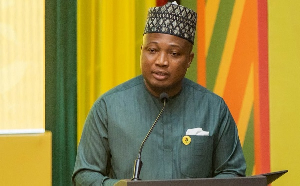Accra, March 9, GNA - The Minister of Justice and Attorney General, Mrs Betty Mould-Iddrisu has observed that unless legal education was reformed, the inefficiencies in the delivery of justice and enjoyment of fundamental human rights would continue unabated.
She has therefore called for a review of the Ghana School of Law's role as well as process of accrediting public and private tertiary institutions that award law degrees.
Mrs Mould-Iddrisu made the observation at the launch of the Ghana School of Law (GSL) 51st Students Representative Council (SRC) Week celebration in Accra on Tuesday.
It is under the theme: "Upholding Fundamental Human Rights - The Role of the Law Student".
The Attorney General said government was considering critical reforms in legal education in the country hence the Ministry of Justice in collaboration with the Director of the GSL and General Legal Council was finalizing proposals for the GSL Bill for submission to Cabinet and Parliament.
She said with the enactment of the law; the school would be turned into a curriculum development, quality control and examination institution. The Minister of Justice said the certification of lawyers to practice in Ghana would also be reviewed to take account of the tremendous increase in the number of persons seeking certification to ensure that the best were selected to practice law.
She noted that GSL was at cross-roads because of challenges that were not addressed by the legal community in Ghana in the last decade. Mrs. Mould-Iddrisu said there was an increase in the demand for legal training but the GSL lacked the capacity to provide space for qualified persons. She said there were many issues relating to the quality of lawyers that passed out annually.
"In the Ministry of Justice, we have 200 State Attorneys all over the country and I see the imperative need for the Ministry working in partnership with the Judiciary and the Ghana Bar Association to instil standard befitting practice of the law on a continuing legal education basis," she added.
To ensure the realisation of full and effective human rights, Mrs. Mould-Iddrisu said efforts were being made in the training and certification of cadre of paralegal who would assist in the drafting of basic court documents, advice on small claims as well as settle disputes through Alternative Dispute Resolution's (ADR). She welcomed moves to further develop the Judicial Training Institute as a mechanism for the selection, orientation and continuous training of judges.
"It is unacceptable to pursue simple commercial dispute for five to 10 years, to have long queues at the Legal Aid Board and waiting endlessly for legal representation," she said.
Mrs. Mould-Iddrisu noted that the human resource base of the Ministry of Justice needed to be augmented in quality and quantity with the 200 State Attorneys for a country with 22.9 million people. "We are also looking at equipping State Attorneys with case management systems as well as the requisite ICT's to facilitate their work," she added. She said this would assist the Ministry to be responsive to the needs of the people.
The Chief Justice, Mrs. Justice Georgina Theodora Wood, in a speech read on her behalf, said every Ghanaian must have access to basic lessons in human rights. She therefore tasked the students to explain to the people their basic rights during vacation.
General News of Tuesday, 9 March 2010
Source: GNA












